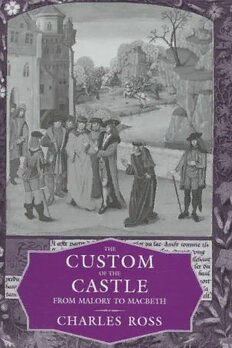
The custom of the castle: from Malory to Macbeth PDF
01997·0.473 MB·English
Most books are stored in the elastic cloud where traffic is expensive. For this reason, we have a limit on daily download.
Preview The custom of the castle: from Malory to Macbeth
Description:
The "custom of the castle" imposes strange ordeals on knights and ladies seeking hospitality--daunting, mostly evil challenges that travelers must obey or even defend. This seemingly fantastic motif, first conceived by Chr?tien de Troyes in the twelfth century and widely imitated in medieval French romance, flowered again when Italian and English authors adopted it during the century before Shakespeare's plays and the rise of the novel. Unlike other scholars who have dismissed it as pure literary convention, Charles Ross finds serious social purpose behind the custom of the castle.Ross explores the changing legal and cultural conceptions of custom in France, Italy, and England to uncover a broad array of moral issues in the many castle stories. He concentrates on single scenes that are common to a series of epics, showing how their nuanced narratives reflect real social limits of order, violence, justice, civility, and political conformity. His investigation of masterpieces from the thirteenth-century Lancelot to The Faerie Queene--by way of Malory, Boiardo, and Ariosto--demonstrates for the first time the impact on Shakespeare's plays, particularly Macbeth, of an earlier way of thinking about the strengths and weaknesses of social customs.
See more
The list of books you might like
Most books are stored in the elastic cloud where traffic is expensive. For this reason, we have a limit on daily download.
